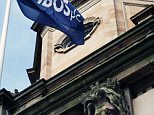Retailers ring up worst festive sales since 2009, after shoppers splurged for Christmas but slashed back spending in new year
- Total retail sales grew by 1.1% between November and January, down from 1.6%
- January like-for-like sales dropped 0.6% compared to the same month last year
- Store sales declined as demand during clearance was predominantly online
Retail sales over the festive period grew at the slowest pace since 2009 as shoppers cut back spending in the new year after strong Christmas trading, a new report shows.
A rise in food sales was not enough to offset a sharp slowdown in sales of non-food items, with total sales growing by 1.1 per cent between November and January, down from 1.6 per cent during the same period last year and the slowest in seven years.
The slowdown was mostly the result of shoppers cutting back on non-food sales, which went from 2.8 per cent growth over last year’s festive months to just 0.3 per cent this year.

Sales slowdown: It was mostly the result of shoppers cutting back on non-food sales in January
Food sales, however, rose 2 per cent compared to 0.2 per cent a year earlier, according to the latest retail sales monitor by the British Retail Consortium and KPMG.
In January alone, like-for-like sales dropped 0.6 per cent on an annual basis, after rising 2.6 per cent during the first month of 2016.
British Retail Consortium chief executive Helen Dickinson said that sales 'ground to a halt' after a strong end to Christmas trading, buoyed only by seasonal stronger furniture sales and a boost for some retailers from Chinese New Year.
'These figures suggest that "caution" was top of new year shopping lists and the uptick in credit card lending at the end of the last year may be short lived. With the signs pointing to upward pressures on shop prices given rising import costs, all eyes will be on the impact of inflation on consumer spending,' she added.

Food: Two-thirds of Britons believe food prices will have the biggest impact on their personal finances this year
Joanne Denney-Finch, chief executive of IGD, said that although food sales continued to be solid, shoppers were most worried about rising food prices.
Two-thirds believe food prices will have the biggest impact on their personal finances this year, ahead of energy bills (58 per cent), petrol prices (53 per cent) and interest rates (28 per cent).
'Some recent cost increases for producers have begun to take effect but with currencies in such a state of flux, the picture for later in the year is very hard to predict,' Denney-Finch added.
Analysts said the retail sales figures as a whole suggest that shoppers might be starting to cut back on spending as their disposable income is squeezed by rising prices and growing personal debt.
Richard Lim, chief executive at Retail Economics said: 'Retailers reported feeble sales growth for January as signs of squeezed disposable incomes are beginning to materialise.
'There are also growing concerns that spending has become increasingly debt-fuelled. Indeed, unsecured lending is growing at the fastest pace since the financial crisis.'
Marc Ostwald, market strategist at ADM Investor Services International, said the sales decline was a warning that the credit-fuelled strength in consumer spending seen in the second half of last year 'may be hitting a speed bump'.

In-store sales declined as demand during clearance was predominantly online, figures show
The sales data also showed that shoppers increasingly prefer shopping online, with store sales falling 2.2 per cent and online sales rising 8.6 per cent over the three months.
Non-food retail online sales grew by 8 per cent in January, nearly half the growth seen in January 2015, when they grew by 14.9 per cent.
BRC boss Helen Dickinson said online sales in January were set against a strong comparative period, as January 2016 recorded the highest growth of last year. But she added that £1 in every £4 of non-food spending was spent online consistently over the last three months.
'It was stores that bore the brunt of the slowdown; posting their deepest three-month decline on record as the demand during retailers’ clearance sales was predominantly online.'
Paul Martin, UK head of retail at KPMG, said: 'The month’s cold snap is likely to have encouraged high street hibernation, with shoppers preferring to browse from the comfort of their own homes.'
-
 JAM hotspots of the UK revealed: Half of Britons say...
JAM hotspots of the UK revealed: Half of Britons say... -
 The year of the price hike: Half of British firms expect...
The year of the price hike: Half of British firms expect... -
 House prices fell £2,000 in January, says Halifax, as...
House prices fell £2,000 in January, says Halifax, as... -
 Twelve-year high for January car sales as buyers flock to...
Twelve-year high for January car sales as buyers flock to... -
 Demand for diesel cars falls as motorists are encouraged...
Demand for diesel cars falls as motorists are encouraged... -
 FTSE CLOSE: Footsie sheds early gains on risk-off day for...
FTSE CLOSE: Footsie sheds early gains on risk-off day for... -
 Cobham chiefs 'stripped cash' from failing firm: £2.3m...
Cobham chiefs 'stripped cash' from failing firm: £2.3m... -
 Boots can help take the strain off the creaking NHS - and...
Boots can help take the strain off the creaking NHS - and... -
 FTSE LIVE: Pound's loss is Footsie's gain, with miners...
FTSE LIVE: Pound's loss is Footsie's gain, with miners... -
 Savers dealt a fresh blow as NS&I; slashes rates on four...
Savers dealt a fresh blow as NS&I; slashes rates on four... -
 Budget airlines price war to benefit millions of...
Budget airlines price war to benefit millions of... -
 MPs call for Lloyds Bank to compensate businesses...
MPs call for Lloyds Bank to compensate businesses...

































